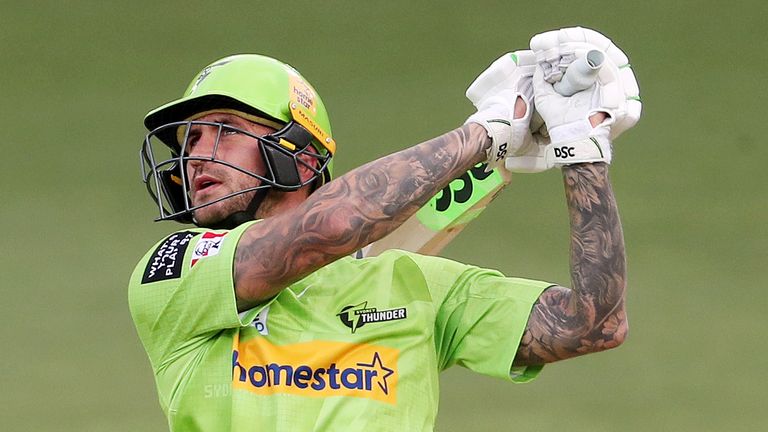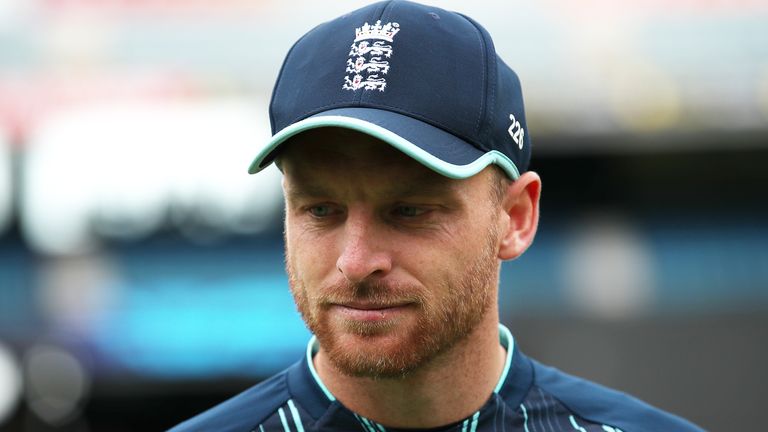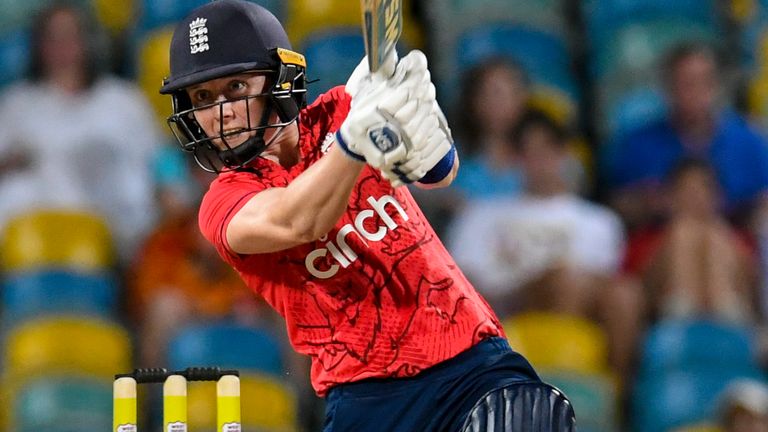[ad_1]
It cannot have escaped your attention that there is a lot of cricket going on.
“The schedule is difficult for people to keeps tabs on and understand what is important and what is not,” said Sky Sports Cricket expert Michael Atherton during England’s three-match one-day international series in South Africa.
Much of that cricket is franchise white-ball cricket.
England’s games against South Africa were shoehorned in between the first and second half of the inaugural SA20, which is taking place the same time as the first International League T20 in the United Arab Emirates.
The T20 tournaments (or 100-ball in The Hundred’s case) just keep on coming, to the benefit of players’ bank accounts but potentially to the detriment of the international game, which Atherton says “is being chipped away at.”
England are not immune to losing players.
Joe Root missed the South Africa series in order to play in the International League T20, while Alex Hales reportedly opted out of the three T20 internationals in Bangladesh in March because he will get significantly more money in the Pakistan Super League.
England white-ball skipper Jos Buttler said: “It’s quite complicated, for sure, and of course there are some frustrations at certain points but I completely understand people’s positions. It’s an individual decision at the end of the day.”
The franchise cricket boom has probably hit West Indies most of all, though, with the Indian Premier League among the tournaments to clash with their home season.
A review following the team’s early exit at the T20 World Cup last year determined that West Indies Cricket will “cease to exist as an entity” if their best players only play in international matches on an “optional” basis while featuring in all T20 leagues.
West Indies Cricket has diminished as an entity already, with the highs of Test series wins at home to England and in Bangladesh mixed with many lows.
The once-mighty Caribbean team sit eighth in the Test rankings, seventh in T20Is and 10th in ODIs. Barring a peculiar set of results, they will have to qualify for the 50-over World Cup in India later this year.
The IPL began a monumental shift in the cricketing landscape ahead of its debut edition in 2008 and while Atherton is pleased players now have ample opportunities, he feels international boards missed the chance to keep the T20 juggernaut in check.
The former England captain said: “It struck me straightaway with absolute clarity that the obvious consequence of the free market coming into the game was that international cricket, for so long the staple of the game, was going to be challenged. That has come to pass.
“I remember standing with a few English journalists when the first IPL auction happened and they were saying ‘this will never catch on’. I was thinking, ‘these players are earning 10 times in a month what they are earning in a year, this is going to change the game’.
“The opportunities now are incredible, for cricketers not necessarily of the top rank. Previously, if you weren’t an international cricketer you didn’t really have a living in the winter months, it wasn’t a lucrative career, but now, if you are perhaps that level below the absolute top-notchers, there are many opportunities.
“That is good for cricketers but if international cricket is to survive and thrive something has to be done.
“World Cups will still be strong – although I don’t think you want one every year as that dilutes things – and Test cricket between sides that can afford it will be strong but the rest of it is being chipped away at by franchise cricket.
“I think administrators were asleep at the wheel from the start. I am not saying it was easy but if they had got together to organise the calendar then maybe they could have made franchise competitions pay an amount for a window that could go into a Test match fund.
“There were innovative ways to think about it but they didn’t think about it as they cannot see beyond the end of the next pay cheque. The game has been damaged now and I don’t see any solutions.”
Atherton’s fellow Sky Sports pundit and former England captain Nasser Hussain views the rise of franchise cricket as a “double-edged sword”, giving fans what they want and rewarding players financially, but impacting national sides and also sometimes stunting cricketers’ development.
Hussain said: “Franchise cricket has already changed the game and there is a lot of good to it – TV companies wouldn’t be paying money if they didn’t think people were watching it. People love franchise cricket and there is nothing wrong with that. But, with everything, there are repercussions, it is a double-edged sword.
“West Indies provide players for the IPL in their primetime home season and it affects them. West Indies have said they can’t do anything – either they let their players go or they try and keep them and the players just go anyway. They can’t win.
“There has been a demise in West Indies cricket and that applies to Zimbabwe and all the other nations, while England, India and Australia [who can pay their players more] get stronger. The ICC must look at that because the sport is better when everyone is given an equal opportunity.
“As for the players, if they get X amount for all those franchise competitions, add that all together and it is going to be a lot more than standing in the field in a four-day game. That is fine, but again look out for the repercussions.
“Suddenly you are just playing white-ball cricket and not getting the rhythm of batting. If your form drops off and someone axes you it will snowball and others will axe you.
“It does concern me that there have been reports of England Lions players not wanting to go on tours because they want to go to T20 leagues. That’s fine if you are playing but some of the younger players may be carrying the drinks.
“Sam Billings, as an example, did this and I only ever saw him with a bib on carrying a drink out to someone. He didn’t improve, he stagnated, so don’t be lured by the cash.”
Atherton thinks a tweak in the way that central contracts are paid could help persuade players to turn out for their country.
“[Nasser and I] were among the first recipients of central contracts – for not very much money, I might add – and they were just for Test cricketers. Now England have a block of 20-odd for all forms paid in various bands depending where the player is at.
“England are now using a larger pool of players so you could reduce the retainer and increase the match and tour fees. Life is about incentive and you want to incentivise people to play.
“At the moment, players have got a whacking retainer but seem to have the freedom within that contract to play elsewhere. By bumping up the match fees, players who want to play for England are encouraged to do so rather than play in franchise cricket.”
Women’s cricket could soon face a similar club vs country conundrum, with the first edition of the IPL – set to take place in March – one of a number of short-form domestic tournaments on the calendar. The five IPL franchises were sold for £465million and players are expected to be paid handsomely.
South Africa’s Lizelle Lee and West Indies’ Deandra Dottin have retired from international cricket – neither will be at this month’s T20 World Cup – in part due to the opportunities elsewhere in the game.
Speaking to the Guardian recently, England captain Heather Knight said: “I think the women’s IPL will be a great thing for the game. It could really kick-start things in other countries. But there are some possible negatives, if it’s not handled properly.
“The differences in pay and professionalism around the world are way more stark in the women’s game compared to the men’s. There also isn’t the same depth in talent for a number of countries.
“The best place you can be is both international and domestic cricket thriving. But you need a good solid plan of how that looks for all countries, not like the men’s game where it has just been allowed to happen without any direction. The women’s game will change far quicker as a result of this.”
[ad_2]
Source link




